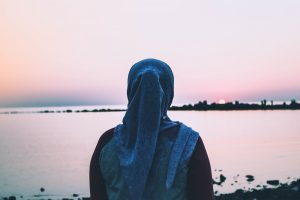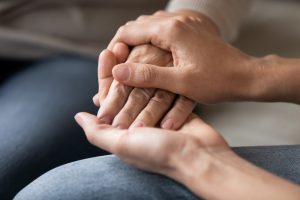#InternationalWomen’sDay

Munavara Ghauri, UK
Editor, Women’s Section
Campaigner Karen Ingala Smith has 3 decades’ experience of researching violence against women. Her recent book, ‘Defending Women’s Spaces’ is dedicated to survivors of domestic violence and to the preservation of female-only spaces, in particular, women’s refuges. It is also dedicated to ‘Any woman who has said no to men in her space or space for her sisters.’[1]
Frankly, as an Ahmadi Muslim woman, I fall into this latter group of women. In my own home, I have my boundaries and space. I do not sit with unrelated men in a social capacity. Neither did my mother and nor do my daughters. Outside my home, my interactions with men remain professional and I support my Muslim sisters who do the same. Segregation between the sexes is something many Muslims practice. Unfortunately, Muslim women can find themselves labelled as oppressed or even abused, as a consequence. In reality, by encouraging such segregation between the sexes, Islam safeguards women.
It is for such protection of women that Ingala Smith and other social activists are increasingly campaigning. Ingala Smith argues that the female sex have a unique set of needs which are often not met in mixed-sex settings and that after encountering abuse in particular, ‘Women need the space to heal, share, acknowledge and celebrate. Being in a women-only space simply feels different.’[2]
As part of Lajna Imaillah, the auxiliary women’s association of the Ahmadiyya Muslim Community which hosts its own women-only events throughout the year, I can relate to this. However, whereas Ingala Smith argues that women recovering from trauma need women-only spaces, Islam teaches that women-only spaces are essential every day for women to flourish and reach their full potentials. A simple example which supports this theory from my own life experience would be my academic performance at school. My sister and I both attended a single-sex school and achieved straight grade A’s in our O Level/GCSE’s (public examinations taken at the age of 16 years). Had I gone to my brothers’ mixed sex school, I am convinced my results would have been significantly different.
The acute need to protect women and girls and provide them with safe spaces nowadays becomes apparent when one reads a few of Ingala Smith’s shocking statistics about the abuse perpetrated against females. Globally, 1 in 3 women will be subjected to violence and abuse by men in their lifetime.[3] Girls are at least three times more likely than boys to report experiences of child sexual abuse.[4] This abuse of girls is not limited to homes and domestic settings but permeates schools as well. Institutions that should be the epicentres of enlightenment and learning are becoming settings where girls are regularly subject to some form of abuse. Ingala Smith cites the OFSTED report of June 2021 which reviewed sexual abuse in schools and colleges in England. 79% of girls said that sexual assaults occur ‘sometimes’ or ‘a lot’. Interestingly, only 38% of the boys out of the 800 children surveyed, felt the same way.[5] It suggests that girls are twice as likely to witness or experience sexual abuse whilst at school.
It is to prevent this sort of endemic abuse that Islam prohibits social interaction between the sexes outside the family circle. This does not represent the inequality of the sexes as is so often misconceived by non-Muslims. In fact, Allah Almighty, our Creator, declares in the Holy Qur’an that He created men and women from ‘a single being; then of the same kind made its mate.’[6]
Islam has taught men to be courteous and mindful of women and to refrain from any sort of behaviour that may be considered as harassment by them. The Holy Prophet (sa) of Islam advised men:
‘The best of you are those who treat their wives best.’[7]
‘Do not strike the handmaidens of Allah.’[8]
‘When you meet two women coming from the opposite direction, do not pass between them; pass on their right or left.’[9]
Commenting upon the exemplary behaviour of the Holy Prophet (sa) of Islam regarding women, the Promised Messiah (as) and Founder of the Ahmadiyya Muslim Community said:
‘If you study the life of the Holy Prophet (peace and blessings be upon him) you will find that he was so gracious that, despite his station of dignity, he would stop even for an old woman and would not move on until she permitted him to do so.’ [10]
Furthermore, His Holiness, Hazrat Mirza Masroor Ahmad (aba), the Fifth Caliph and Worldwide Head of the Ahmadiyya Muslim Community, has clarified the high status of women in Islam and explained why women are given their own space at events within this Community:
‘Separate venue, not value. Separate halls or marquees for women and for men, but the values are the same and the separate place has nothing to do with their teaching, their skills, their potential.
It’s a matter of understanding. Our women feel that according to our teaching, if they hold their meeting separately and without the umbrella or shadow of men, then they can do better.’[11]
Whether or not people agree on social and religious events being segregated, there are certain spaces like women’s refuges, hospital wards and public toilets, which most people accept are best remaining single sex. After having worked in a women’s refuge for six months, I have now witnessed first-hand the level of trauma that women and their children suffer in the aftermath of domestic violence. It is then with the support, trust and leadership of a female-led team in a women-only space, that they are enabled to rebuild their lives and look to the future in a more positive light.
It is why today on #InternationalWomen’sDay and in fact every day, every woman, every man born of a woman, every Muslim and non-Muslim, should pledge to defend women’s spaces.
About the Author: Munavara Ghauri BA (Hons) Eng Lit, is married with 3 children and works as a School Librarian and in a Women’s Refuge. She is currently serving as the Branch Leader for the Bournemouth Women’s Auxiliary Organization of the Ahmadiyya Muslim Community and is an Editor for the Women’s Section of The Review of Religions.
ENDNOTES
[1] Karen Ingala Smith, Defending Women’s Spaces, Polity Press, 2023
[2] Ibid, p72
[3] Ibid, p59
[4] Ibid, p24
[5] https://www.gov.uk/government/publications/review-of-sexual-abuse-in-schools-and-colleges/review-of-sexual-abuse-in-schools-and-colleges
[6] Holy Qur’an Ch39.V7
[7] M Z Khan, Wisdom of the Holy Prophet, Unwin Brothers Ltd, 1981, p11
[8] ibid
[9] M Z Khan, Wisdom of the Holy Prophet, Unwin Brothers Ltd, 1981, p9
[10] The Essence of Islam, Vol . III Islam International Publications Ltd, 2005, p312
[11] https://www.farnhamherald.com/news/long-read-muslim-leader-charts-journey-from-persecution-in-pakistan-to-leafy-tilford-193980




Add Comment